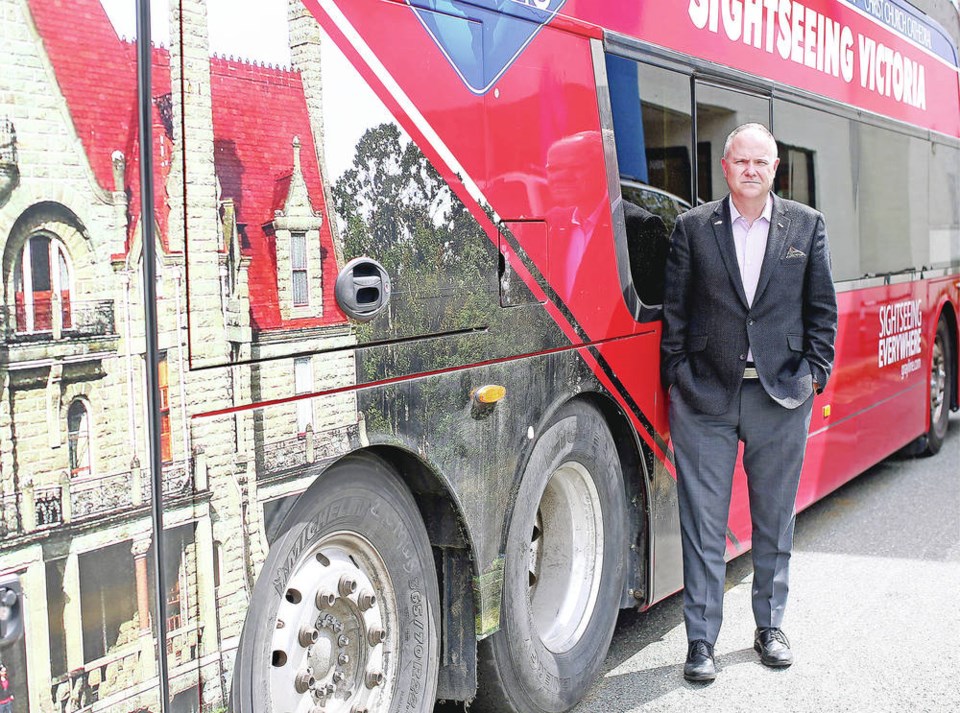A commentary by the president and CEO of Wilson’s Transportation of Victoria.
Time is running out for the motor coach industry, with many operators facing permanent closure in the next two or three months without meaningful financial aid.
The COVID-19 pandemic has had a devastating impact on the industry, which has seen a 95 per cent drop in revenue since March. Ninety per cent of fleets have been parked.
This year might see an improvement, but to no more than 50 per cent of the usual revenue. It is estimated that it would take at least 20 months for the industry to recover. We don’t have that much time.
Government relief efforts are not sufficient to offer significant or lasting support to the average motor coach company. Unless action comes quickly, British Columbians will learn, the hard way, the value that the industry brings.
The industry is crucial to the tourism industry, which in 2018 accounted for more than $20.5 billion in revenue for more than 19,000 tourism-related businesses, which often rely on motor coaches to bring guests to their destination.
It has been estimated that each group travelling via motor coach generates $10,000 to $15,000 per day in economic activity and spending in the local economy.
As Paul Nursey, the CEO of Destination Greater Victoria, says, motor coaches are “the connective tissue and in many cases the glue that holds it all together.” They make it possible for visitors to get to Butchart Gardens, the Sea to Sky Gondola, wine and agricultural tours and much more.
The Victoria Cruise Industry Alliance reports that more than 700,000 passengers and 300,000 crew members visited Victoria in 2019. Without motor coaches, transportation options would be limited, posing a significant problem to a successful return of cruise ships in our region.
The industry is a key partner to Indigenous Tourism B.C., helping visitors get to some of the 200 Indigenous communities in the province.
The industry offers huge benefits beyond tourism.
It serves as an economical, safe and reliable transportation option for community groups, youth groups, sports teams, seniors’ groups and school field trips.
It provides transportation to the masses when evacuations are required — for instance, when devastating wildfires hit the Interior. Coaches have safely transported volunteer relief workers, armed forces, RCMP officers, safety and medical equipment and supplies.
Motor coach operators work with organizations such as Canadian Blood Services to ensure that donors and staff can continue their work. We provide access to medical appointments and help deliver food and toys to families in need.
Political parties are transported via motor coaches during their campaigns. Motor coaches also ensure British Columbians can get to voting stations.
Major industrial projects require thousands of skilled trades to be shuttled in and out of camps, and from their permanent homes to the communities, usually remote, near the camps.
Large sporting events have a substantial economic impact, bringing visitors from all over the world. These events could not happen without motor coaches.
Athletes, officials, spectators and volunteers need to get to and from these events. Think of the World Junior Hockey Championships in Vancouver and Victoria in 2018, the NCAA Women’s Basketball Championships at the University of Victoria in 2019, the 2010 Olympics and the 1994 Commonwealth Games.
The industry includes intercity bus services, which had been struggling before the pandemic.
That is why Greyhound pulled out of Western Canada in 2018. Greyhound had serviced 360 stops in the West, and intercity busing was the only service to 300 of those stops.
Other companies across B.C. and Alberta took over some of Greyhound’s former routes, and soon faced the same challenges that Greyhound had faced.
These businesses rely on passenger fares to cover expenses. With the drastic decline in passengers since March, and continuous restrictions and concerns surrounding travel, many services have suspended operations. Many routes might be abandoned altogether unless relief comes soon.
While other modes of transportation have received more than $1 billion in subsidies and financial relief from the federal and provincial governments, intercity bus services have been left struggling to keep their wheels turning.
The impact of a closure would be felt on Vancouver Island.
“The motor coach industry is integral to residents of small, rural communities and any reductions in service would have a significant impact on Tofino,” says Jen Dart of the Tofino Long Beach Chamber of Commerce.
Beyond all of the ways the motor coach industry serves everyone, consider the benefits to the environment.
A motor coach has the potential to remove as many as 55 autos from the highway, reducing congestion. Even when travelling at less than full capacity, motor coaches have the smallest carbon-emission factor of any major motorized vehicle.
A couple boarding a motor coach will cut their carbon nearly in half compared with driving a hybrid car. A couple taking a motor coach rather than flying will cut their emissions by 55 to 75 per cent, depending on the distance.
Travelling on a scheduled service such as the B.C. Ferries Connector between Victoria and Vancouver will reduce emissions by 76 per cent compared to four passengers in a car.
Motor coach travel is more fuel efficient than public transit because motor coaches encounter much less stop-and-go traffic. They have notably lower carbon emissions.
Every person who chooses motor coach travel instead of driving alone reduces his or her carbon dioxide emissions by an average of 85 per cent.
The motor coach industry can help the provincial government meet its stringent new emissions targets for 2025.
Assuming, that is, that the industry is still around.



